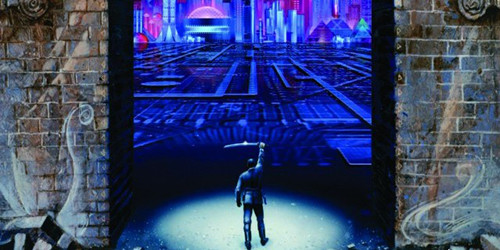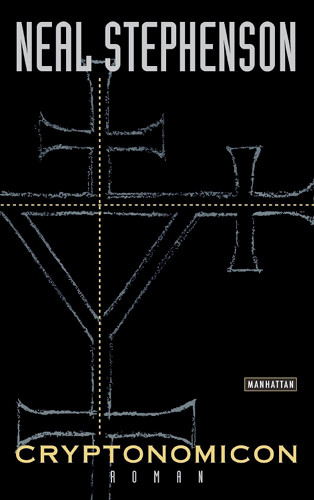Excerpt from the novel Snow Crash ![]()
![]() by Neal Stephenson
by Neal Stephenson ![]()
![]()
Another news piece, this one apparently done a few years later. Again we are on the Enterprise, but this time the atmosphere is different again. The top deck has been turned into an open-air refugee cam. It is swarming with Bangladeshis that L. Bob Rife plucked out of the Bay of Bengal after their country washed into the ocean in a series of massive floods, caused by deforestation farther upstream in India—hydrological warfare. The camera pans to look out over the edge of the flight deck, and down below, we see the first beginnings of the Raft: a relatively small collection of a few hundred boats that have glommed onto the Enterprise, hoping for a free ride across to America.
Rife’s walking among the people, handing out Bible comics and kisses to little kids. They cluster around with broad smiles, pressing their palms together and bowing. Rife bows back, very awkwardly, but there’s no gaiety on his face. He’s deadly serious.
“Mr. Rife, what’s your opinion of the people who say you’re just doing this as a self-aggrandizing publicity stunt?” This interviewer is trying to be more of a Bad Cop.
“Shit, if I took time out to have an opinion about everything, I wouldn’t get any work done,” L. Bob Rife says. “You should ask these people what they think.”
“You’re telling me that this refugee assistance program has nothing to do with your public image?”
“Nope, L—”
There’s an edit and they cut away to the journalist, pontificating into the camera. Rife was on the verge of delivering a serman, Hiro senses, but they cut him off.
But one of the true glories of the Library is that it has so many outtakes. Just because a piece of videotape never got edited into a broadcast program doesn’t mean it’s devoid of intel value. CIC long ago stuck its fingers into the networks’ videotape libraries. All of those outtakes—millions of hours of footage—have not actually been uploaded to the Library in digital form yet. But you can send in a request, and CIC will go and pull that videotape off the shelf for you and play it back.
Lagos has already done it. The tape is right there.
“Nope. Look. The Raft is a media event. But in a much more profound, general sense that you can possibly imagine.”
“Oh.”
“It’s created by the media in that without the media, people wouldn’t know it was here, Refus wouldn’t come out and glom onto it the way they do. And it sustains the media. It creates a lot of information flow—movies, news reports—you know.”
“So you’re creating your own news events to make money off the information flow that it creates?” says the journalist, desperately trying to follow. His tone of voice says that this is all a waste of videotape. His weary attitude suggests that this is not the firsts time Rife has flown off on a bizarre tangent.
“Partly. But that’s only a very crude explanation. It really goes a lot deeper than that. You’ve probably heard the expression that the Industry feeds off of biomass, like a whale straining krill from the ocean.”
“I’ve heard the expression, yes.”
“That’s my expression. I made it up. An expression like that is just like a virus, you know—it’s a piece of information—data—that spreads from one person to the next. Well, the function of the Raft is to bring more biomass. To renew America. Most countries are static, all they need to do is keep having babies. But America’s like this big old clanking, smoking machine that just lumbers across the landscape scooping up and eating everything in sight. Leaves behind a trail of garbage a mile wide. Always needs more fuel. Ever read the story about the labyrinth and the minotaur?”
“Sure. That was on Crete, right?” The journalist only answers out of sarcasm; he can’t believe he’s here listening to this, he wants to fly back to L.A. yesterday.
“Yeah. Every year, the Greeks had to pony up a few virgins and send them to Crete as tribute. Then the king put them into the labyrinth, and the minotaur ate them up. I used to read that story when I was a kid and wonder who the hell these guys were, on Crete, that everyone else was so scared of them that they would just meekly give up their children to be eaten, every year. They must have been some mean sons of bitches.
“Now I have a different perspective on it. America must look, to those poor little buggers down there, about the same as Crete looked to those poor Greek suckers. Except that there’s no coercion involved. Those people down there give up their children willingly. Send them into the labyrinth by the millions to be eaten up. The Industry feeds on them and spits back images, sends out movies and TV programs, over my networks, images of wealth and exotic things beyond their wildest dreams, back to those people, and it gives them something to dream about, something to aspire to. And that is the function of the Raft. It’s just a big old krill carrier.”
Finally the journalist gives up on being a journalist, just starts to slag L. Bob Rife openly. He’s had it with this guy. “That’s disgusting. I can’t believe you can think about people that way.”
“Shit, boy, get down off your high horse. Nobody really gets eaten. It’s just a figure of speech. They come here, they get decent jobs, find Christ, buy a Weber grill, and live happily ever after. What’s wrong with that?”
Rife is pissed. He’s yelling. Behind him, the Bangladeshis are picking up on his emotional vibes and becoming upset themselves. Suddenly, one of them, an incredibly gaunt man with a long drooping mustache, runs in front of the camera and begins to shout: “a ma la ge zen ba dam gal nun ka aria su su na an da . . . ” The sounds spread from him to his neighbors, spreading across the flight deck like a wave.
“Cut,” the journalist says, turning to the camera. “Just cut. The Babble Brigade has started up again.”
The soundtrack now consists of a thousand people speaking in tongues under the high-pitched, shit-eating chuckles of L. Bob Rife.
“This is the miracle of tongues,” Rife shouts above the tumult. “I can understand every word these people are saying. Can you, brother?”



